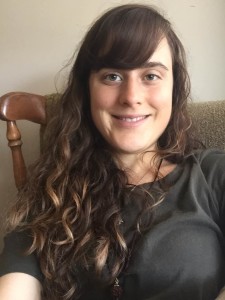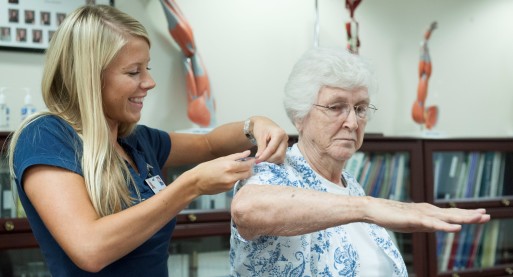Today is an interview with Suzanne Roche, an occupational therapist located in Northern California. Suzanne currently works in a nursing home, and she was kind enough to sit down with SevenPonds to explain her experience as an occupational therapist and how important occupational therapy is to end of life care.

Credit: Suzanne Roche
Augusta: Thank you so much for agreeing to do this interview with SevenPonds! For starters, just to provide our readers with some basic info, what exactly is occupational therapy?
Suzanne: Yes, so, occupational therapy is a broad discipline. Basically, what we do for the people that we serve is help them with whatever is meaningful and purposeful for their lives. It can be in a variety of settings — work, school, a nursing home or hospital. I currently work in a nursing home, and we work with people who have had hip or knee replacements, people who are dealing with Alzheimer’s, dementia, strokes, etc. Within that small population of people, I’m helping individuals with daily life skills — from dressing to bathing. I’m helping them relearn those skills so they can go home and live a more meaningful and purposeful life.
Augusta: That’s really wonderful. Have you always worked in a nursing home?
Suzanne: Well, I’ve been out of school for two years. Since graduation, I moved up here (Northern California) and have been working at a nursing home for the last two years.
Augusta: On that note, what does becoming an occupational therapist entail?
Suzanne: You get your undergraduate degree, then you go on to get your Master’s in occupational therapy. And then, there are so many areas of occupational therapy — it’s really awesome. You can go and get a specialty in, for example, hands, or pediatrics or neuro. There are so many different disciplines and areas.

Credit: usi.edu
Augusta: Oh wow, I didn’t realize there were so many options!
Suzanne: They’re endless!
Augusta: What made you want to do this in the first place? Have you always wanted to be an occupational therapist?
Suzanne: Yeah, I did! What brought it about was actually that my grandmother had Alzheimer’s disease and was in a nursing home. We would go and visit her, and that was the first time I learned about what an occupational therapist was and what they do, because I saw them working with my grandmother. I saw the therapist really engaging with my grandmother and treating her just like I wanted her to be treated. She (the occupational therapist) had the time and energy to offer my grandmother, unlike the doctors or nurses who are just in and out. She was really connecting with my grandmother. I think I was maybe 16 at the time and just knew, “Yep, that’s what I want to do.” So I pretty much knew I wanted to be an occupational therapist since the time I graduated high school.
Augusta: What does your usual day entail as an occupational therapist? What does a regular day look like for you?
Suzanne: In a typical day, I’ll have anywhere from six to nine patients and will see them anywhere from 30 to 75 minutes each. Basically, I go in to the nursing home and see what patients are ready, and we go through any bathing or dressing. And then if anyone needs feeding, I’ll do lunch with them. Then it will go into exercise — strengthening, balance, endurance and things like that.

Credit: tanamatales.com
Augusta: What would you say is the connection between occupational therapy and end of life?
Suzanne: So, for me, end of life is such a broad term. For me, it’s anyone confronting their death and their mortality. And a lot of these patients, their lives are completely different from the lives they once knew. They may live 6 months, one year, maybe even longer than that, but it’s really about confronting end of life and helping them deal with that process as well. And giving them purpose and meaning in their later years.
So even though their life is not what it once was, how can they have meaning and purpose up until the day that they do go? And there are a lot of occupational therapists who work specifically in palliative care and hospice. It’s literally their job to give meaning and purpose to these patients’ lives.
Augusta: It seems like, in occupational therapy, you are probably addressing end of life and growing older head-on. It’s certainly not a job that shies away from end of life. Do you feel like you try to help people confront and deal with end of life?
Suzanne: It’s certainly something I practice. How I confront it is by thinking, “This is what we have right now; this is where you are right now, and who knows where you could go from here? Never say never, you know? Keep positivity of potentially regaining skills and improving.” Your life [everyone’s] isn’t promised, so we just make due with what we have and always look towards the positive.
Augusta: Yes, that sounds like a good way for everyone to live their lives! It’s funny that it often takes us till the end of our lives to start realizing we ought to live each moment to the fullest.

Credit: huffpost.com
Suzanne: It’s true. We don’t have to confront it [death] like someone in occupational therapy. But it’s still there!
Augusta: How much of your work do you feel revolves around end of life? Do you feel inundated with it — not necessarily in a bad way — but is it a part of your daily life?
Suzanne: Definitely. I mean, working in the nursing home and with geriatric patients, most of them are going through that end-of-life process. So they deal with it every day.
Augusta: Is that difficult? Are you used to it? Do you ever get used to it?
Suzanne: It’s my first job out of school, and it has opened up a whole new lens for me. It is hard. It’s challenging, because I’m confronted with my own mortality. It has really compelled me, though, to confront that fear within myself, and to offer that to patients. I’m continuing my studies in death and dying and how to assist patients and families through that realm. Because I do think it is an ignored thing, and I think if we did confront it more, we’d teach everyone to live a little more fully.
Augusta: Are there any personal experiences you can share with SevenPonds relating to this?
Suzanne: I would say the biggest takeaway for me (which also relates to my personal life and what I’ve observed in myself ) is that there’s always something — whether it’s holding on to a loved one and not wanting them to die, or holding on to a part of ourselves — we don’t want to let go of. For me, it’s about stepping into that fear and allowing that thing to die, and realizing that life can continue and evolve. Just because that part of us is gone or that person is gone, it doesn’t mean that they’re not a part of our lives anymore. Oftentimes, the things and the people that are not in our lives are the things and people that impact us most. So it’s really realizing that although we’re letting go of something in physical form, it is still a part of us, and we have to let it go in order to grow. That’s just the circle of life.
Augusta: That’s so beautiful and eloquent! Thank you so much for taking the time to talk to SevenPonds, and thank you for what you do for everyone you come into contact with!
Suzanne: Thank you for taking the time to listen!

 What Is Occupational Therapy and Its Benefits at End of Life? An Interview with Suzanne Roche, Part One
What Is Occupational Therapy and Its Benefits at End of Life? An Interview with Suzanne Roche, Part One


 How Dare You Die Now!
How Dare You Die Now!
 Debating Medical Aid in Dying
Debating Medical Aid in Dying
 “Help Me, Helen”
“Help Me, Helen”














